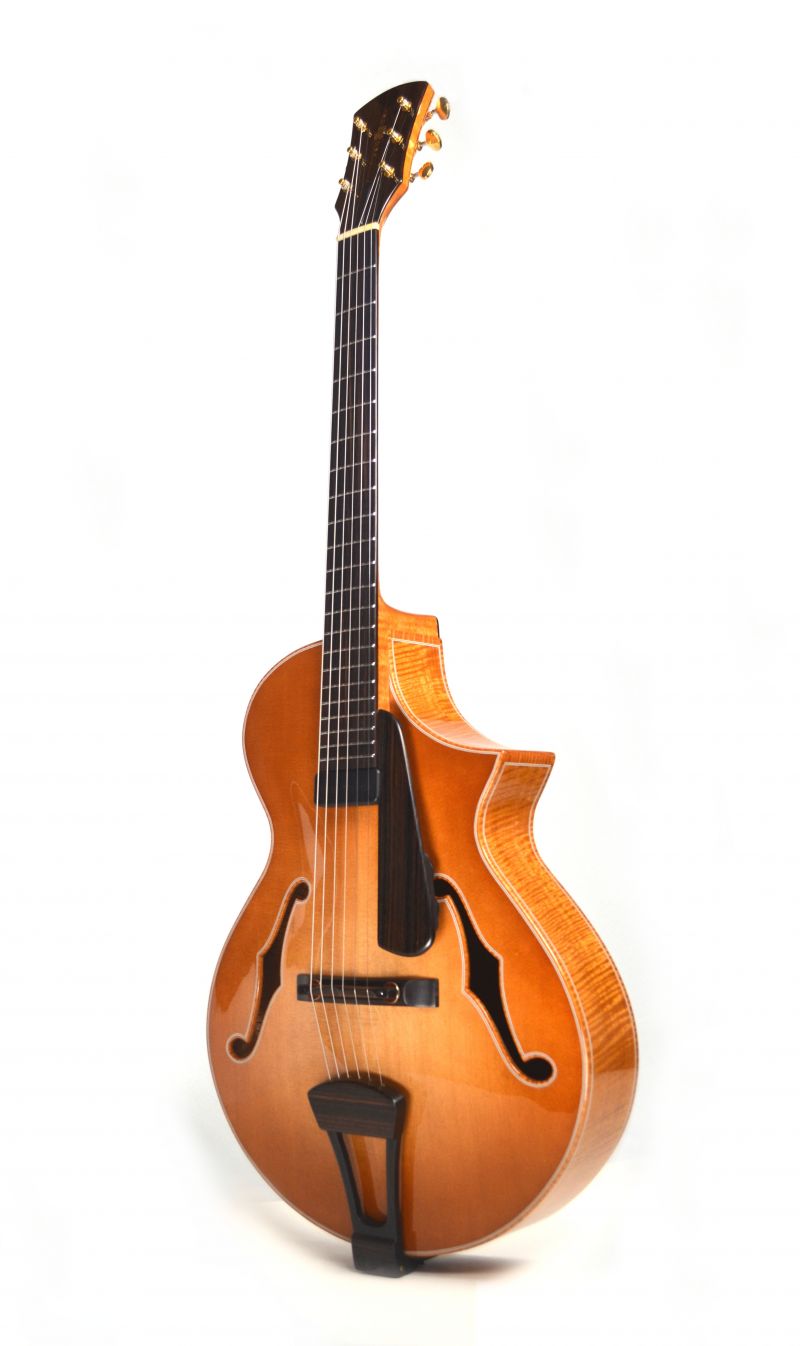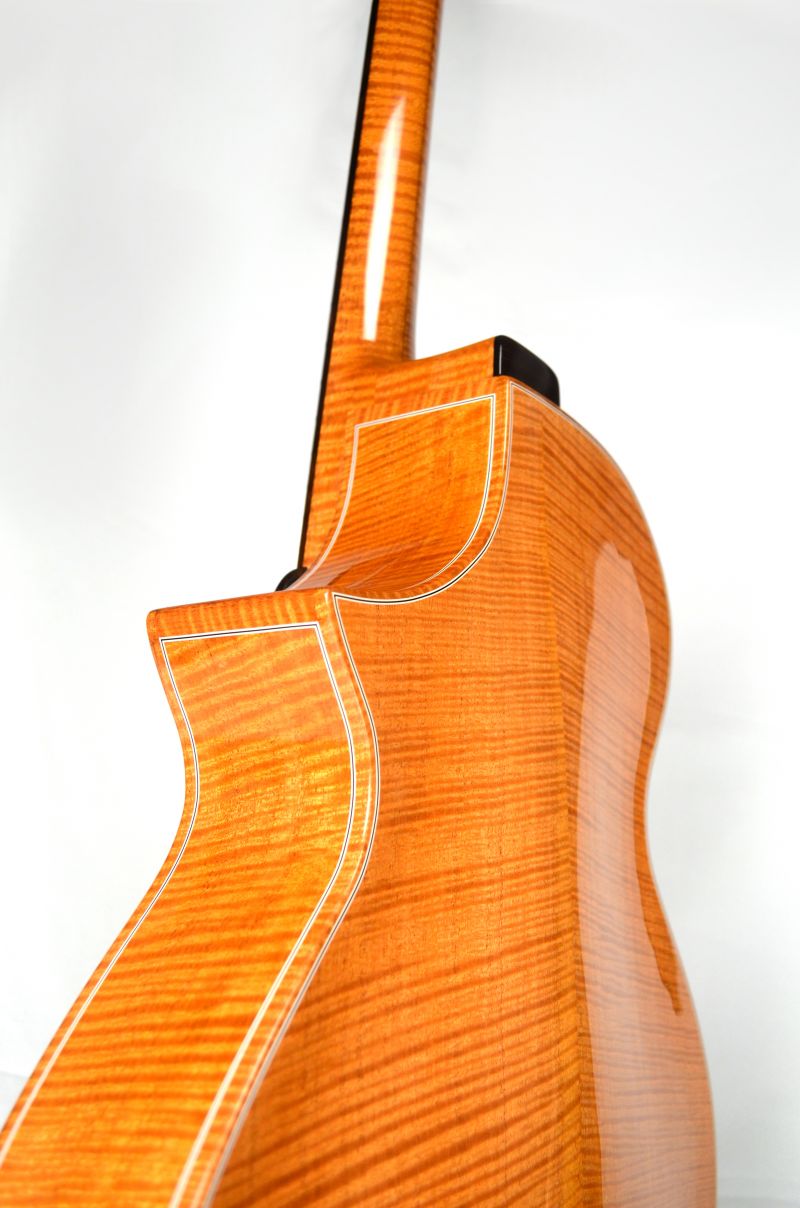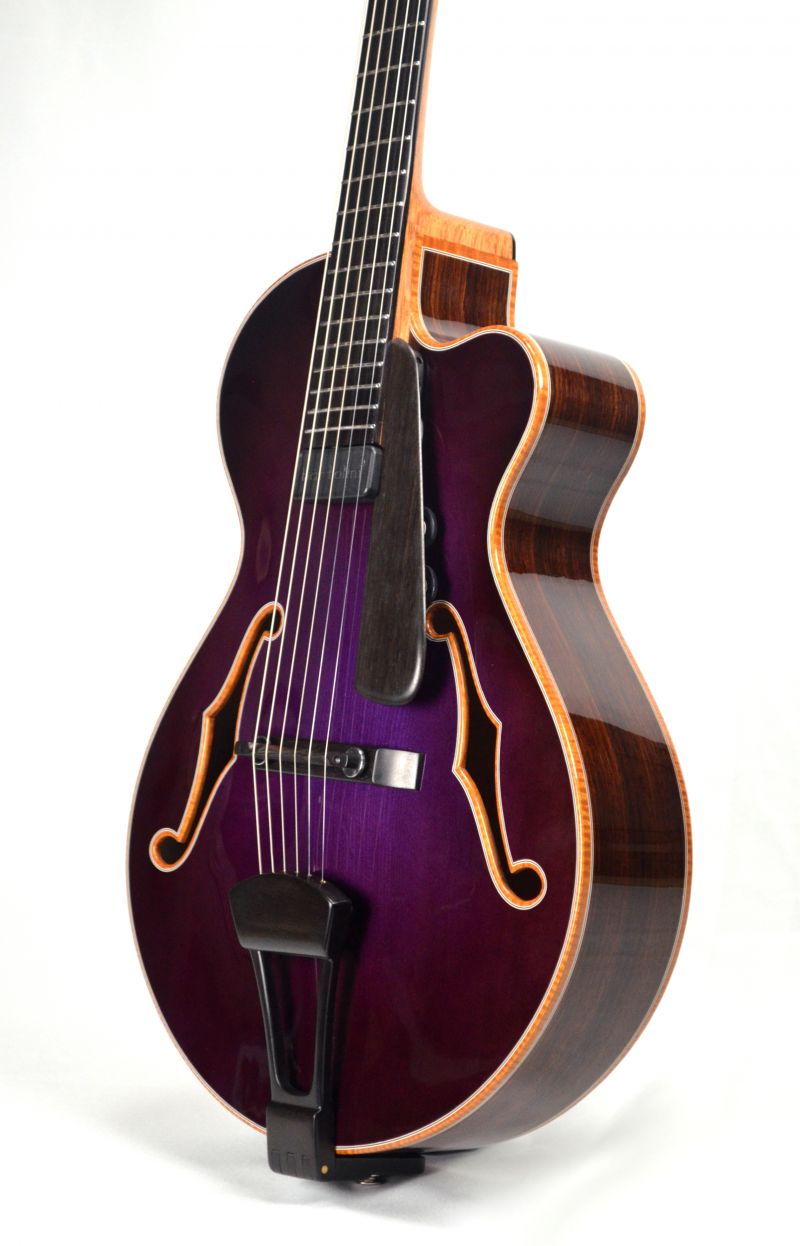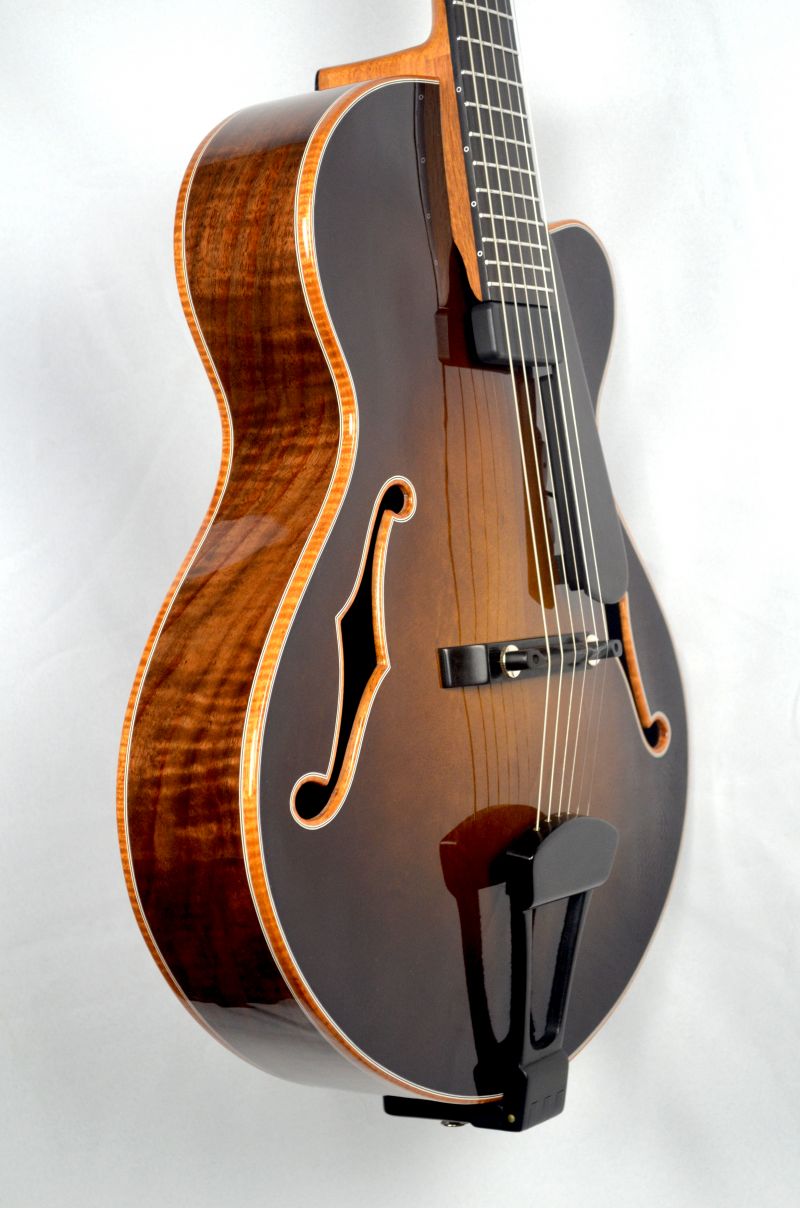Maegen Wells Guitars and Mandolins One Woman Shop Pushes Lutherie to New Heights
Maegen Wells found herself captivated by two forces early on in her life; the guitar and tools. Her fascination with both eventually led her to lutherie, and today, as a top luthier in the music products community. Wells now owns and operates a successful shop where she crafts archtop guitars and mandolins.
Over recent years Wells has been featured in numerous articles as she continues to take the boutique guitar market by storm. Wells is currently preparing to exhibit at The 2020 NAMM Show’s Boutique Guitar Showcase: a unique collection of more than 40 luthiers showcasing one-of-a-kind guitar designs to a global audience. Wells set aside some time and stepped away from the bench to sit down with us to share her passions as a luthier.
Why The Tree Bends from Lazarus Dance on Vimeo.
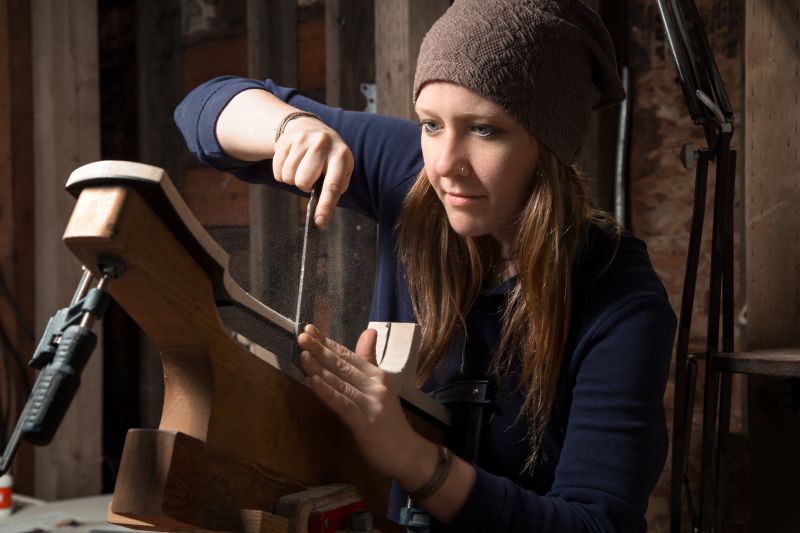
Where did your passion for building guitars come from?
My obsession with guitars started at a very young age. By the time I was nine years old, I was saving up all my money from mowing the lawn to buy my first Stratocaster - bright red. In addition to this, at a very young age I found I loved mowing the lawn because I loved operating the lawn mower. I was fascinated by this machine that cut grass with blades and I begged my parents to let me do it. A similar story took place a few years later, when watching my dad use a chainsaw, and again when watching my mom remove tile in the kitchen with a chisel and hammer. Meanwhile, playing guitar was what I lived for. I continued to write music and perform throughout high school, as well as take all the woodworking courses my school offered. It was here that I realized my love for woodworking. My two passions in life merged into one the summer after I graduated, and it was very clear that this was my purpose in life. These six stringed instruments had taught me so much, and I felt like the best way to give back was by bringing guitars into the world to help others, just like they had helped me. This was not a choice - it was a surrender to my calling.
You initially started building guitars and then expanded into the mandolin family. What was the motivation to go beyond the archtop?
A few years ago, I came across a 1921 Gibson Mandolin that stole my heart. I was blown away by the volume and sustain that came from such a tiny instrument and I immediately knew this beautiful mandolin had something to teach me. It sounded incredible and was nearly a century old; both features that I wanted to accomplish with my instruments. I started doing research on the history of mandolins and Orville Gibson and discovered that the history of archtop guitars and mandolins go hand in hand with each other. It was then that I realized that if I could make a great mandolin, it would only make me a better archtop builder.
Is there a particular project that you have/are looking forward to more than others?
A: I have a very special project called “The Fiddleback Series” that will be taking place over the next 29 years of my life. Early in 2018, I came across some out-of-this-world fiddleback mahogany. It was reported that the entire tree had the most intense flamed figure that had ever been seen in mahogany and from it they harvested 398 back and sides sets for guitars. Since archtops have carved tops and backs, it requires the materials we use to be very thick. In an effort to efficiently process this rare material, only 10 sets were cut for archtops. I’m humbled and honored to be in possession of six of these precious sets and I’ll be using it to represent my evolution as a builder by building one guitar with it every five years. At the age of 50 I’ll have one set left, and I’ll wait ten years to use that final set. I built the very first one in 2018 at the age of thirty, and it’s the most amazing material I’ve ever worked with and it resulted in one of the best sounding guitars I’ve ever made.
What do you see as the biggest benefit being a female luthier in a traditionally male dominated field?
It’s a fascinating thing that happens when you don’t look anything like everyone else in the room. There’s an automatic spotlight that comes with that - I suppose this could be perceived as a benefit. Honestly, I rarely think about the fact that I am in a male dominated industry - I just don’t see it that way. These are some of the coolest, most amazingly talented, and supportive people I’ve ever met in my life. I’m not so sure I would have ever noticed how outnumbered I was, if it weren’t for the fact that people from the outside world are always pointing it out to me. The inevitable spotlight came early on in my career, even though my work was not to a point where I deserved it. This served as a tremendous motivation to work as hard as I could and to get my work to a level that would be worthy of said spotlight. As my peers and colleagues have watched me grow, I truly believe the spotlight I am in has more to do with how hard I’ve worked and the failure I continue to overcome, then it does my gender.
To truly answer the root of the question, the best part is: this male dominated industry, does not want to be a male dominated industry. Perhaps we will never know why more females aren’t drawn to this work, or other male dominated trades, but I can tell you one thing - in today’s world of lutherie, it’s not a result of not being welcome. Ever since I started building guitars thirteen years ago, I’ve been met with an overwhelming amount of encouragement and I would be completely lost without the support of this very special community, that just so happens to be mostly men.
Do you have any advice for aspiring luthiers?
Think long term. Learning this craft is a lifelong mission. I’ve been completely devoted to building guitars since 2006 and I’m just now getting to a point where I feel like I might have some sort of understanding of what I’m doing. Stay focused on your work and true to your vision, while also allowing room from that vision to change and grow. There’s going to be a lot of failure; learn to love it for what it has to teach you.
We were able to connect initially through your Instagram account, @maegenwellsguitars, which does an excellent job of beautifully showcasing your work. Do you have any tips for those hoping to improve their professional social media presences?
Stay focused on the content of your work, be consistent with what you post, don’t over post and keep it professional. Be careful; although social media enables you to share your work with people worldwide, it also serves as a tremendous distraction. So again; stay focused. Be honest about your progress. It’s very easy to make it seem like you’re getting lots done - but you’ll be in trouble when it comes time to actually deliver to a real-life client, as opposed to just keeping up the illusion of your progress. The truth is, I really give my social media very little effort, but by staying true to these guidelines it has resulted in a very natural growth. I don’t use social media to engage with others or build friendships - I save that for real life. I simply share photos of the beautiful moments that come across my bench and I think people have come to appreciate the consistency of my posts and that they’re focused on my work (with occasional appearances from my perfect dog, Lutherie).
You’ve been exhibiting at NAMM Shows since 2017, how has your experience changed over the last few years? Will you be at The 2020 NAMM Show and if so, anything in particular you’re looking forward to?
I’m very happy to say I will be returning to NAMM 2020 for my third year displaying with the Boutique Guitar Showcase. It’s unlike anything I’ve experienced, and both years at the end of the show, it was clear that this four-day event had a monumental impact on my shop. Whether it was Victor Wooten coming to check out my work, or Reverb.com posting a photo of my guitar - these things are game changers, and you just never know what’s going to happen. I suppose that’s what I’m most looking forward to next year - walking into that convention hall and knowing that in five days when I walk out, life is going to be a little bit different.


